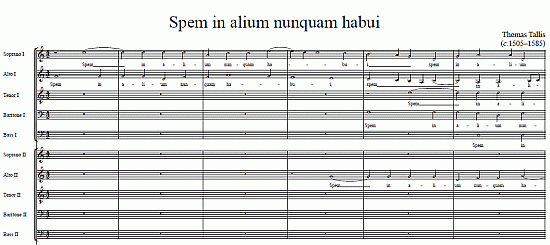
Reading Tony Hendra’s Father Joe: The Man Who Saved My Soul (Amazon) today, I found his first experience with Gregorian chant to resonate with mine, and my experience much sacred music in general. He writes of the sense that this was a timeless music, a music that arose from the passion of the spirit, the soul, instead of the passion of the heart, like most music. I’m not convinced much of what passes for music today could be said to have arisen from the passion of the heart. I rather think its origins are more hedonistic. That being said, much of the music I listened to growing up impressed me with its passion. “Here are people creating from the heart,” I thought.
Then I heard medieval polyphany for the first time. In college, a professor introduced us to Thomas Tallis, and I was immediately in love. Here was the intricacy of the soul itself laid bare. (It’s a bit tragic now that this particular piece will be associated in the popular mind with Fifty Shades of Grey, but the upside, if there is one, is that more people have been exposed to this glorious music and perhaps will investigate Tallis and his contemporaries — Byrd, Desprez, and others.)
Listening to this music, I had, and still have, the experience of ecstasy in the classical Greek sense of ecstasy — ek meaning “outside” and stasis meaning “a stand” — to stand outside oneself.
It was the first real hint I had of the spiritual, the first existential evidence I had of something more.
0 Comments